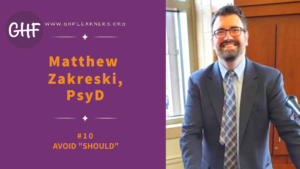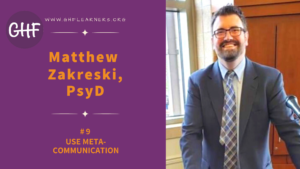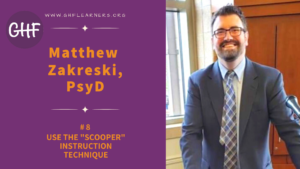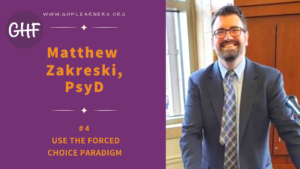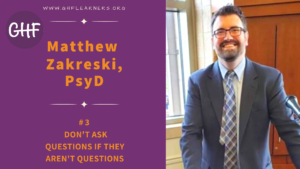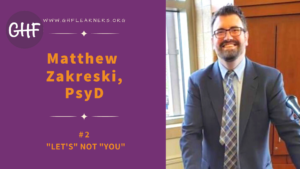(Bonus!) The power of “that sucks.” I’m a big fan of the TV show Parks and Recreation. In one of the later episodes, Chris Trager (played by the indomitable Rob Lowe) is trying to meet every single possible need of his very pregnant girlfriend Ann Perkins (played by the fabulous Rashida Jones). He makes smoothies, rubs her feet, and basically takes care … [Read more...] about #11 Ten ways: (Bonus!) The power of “that sucks.”
#10 Ten ways: Avoid “Should”
Avoid “Should.” Should is a dangerous word in self-esteem, performance, mental health, and relationships. One of my colleagues says that the word “Should” is really an abbreviation of the words Shame and Could. So you take the infinite possibility of the word “could” (I could do this, we could do that, etc.) but add shame to it, so that possibility is couched … [Read more...] about #10 Ten ways: Avoid “Should”
#9 Ten ways: Use meta-communication.
Use meta-communication. I love this point because it sounds SO NERDY. Talking about talking? The prefix meta?! ::Groan:: Nerdiness aside, however, I have found that adding these conversational techniques into our daily communication increases understanding, empathy, and success in difficult interactions. Meta-communication is talking about … [Read more...] about #9 Ten ways: Use meta-communication.
#8 Ten ways: Use the SCOOPER Instruction Technique
Use the SCOOPER Instruction Technique – No, this is not another summer job for your kids. The SCOOPER technique is an acronym for how to give instructions to increase your chances of getting the tasks you need accomplished done. S – Same Place (don’t shout across the house; make eye contact)C – Clear instructions (know what you want BEFORE you give directions)O – One … [Read more...] about #8 Ten ways: Use the SCOOPER Instruction Technique
#7 Ten ways: Help to name emotions
Help to name emotions. If you go back to the brain/nervous system information that I referenced in #4, you’ll notice that I talked about how to help manage our kids when they are so upset that their good “wizard brains” are offline. In this step, we are going to practice how to help our kids get out of that “lizard brain” headspace and back towards … [Read more...] about #7 Ten ways: Help to name emotions
#6 Ten ways: What not Why
What not Why – One of my pet peeves is when someone answers a Why? Question with “because.” Like that’s even an answer! (or a complete sentence!) There are so many great words in language and to just smugly say, “because” is irritating to me. I was complaining about this to a colleague and she pointed out that I kept hearing the wrong answers because I … [Read more...] about #6 Ten ways: What not Why
#5 Ten ways: Challenge absolute statements with the power of “yet”
Challenge absolute statements with the power of “yet” – We hear a lot of absolute statements when we work with kids. “I can’t do this!” “I’ll never be good at writing!” “I have always hated orange juice!” In any situation, these statements are painful to hear, as they represent the pain and frustration that our students are feeling. But absolute … [Read more...] about #5 Ten ways: Challenge absolute statements with the power of “yet”
#4 Ten ways: Use the forced choice paradigm
Use the forced choice paradigm – When kids are upset, they can do lots of things: melt down, lash out, shut down, etc. All these states represent altered neuropsychological functioning, usually marked by an excess of emotion that the body is unable to process. If the body is overloaded on emotion, the “lizard brain” (the oldest part of the brain, responsible for our … [Read more...] about #4 Ten ways: Use the forced choice paradigm
#3 Ten ways: Don’t ask questions if they aren’t questions
Don’t ask questions if they aren’t questions – I have a good friend who is a lawyer (who shall remain nameless for the purposes of this article) who often admonishes me for asking questions when I don’t have to. It is a common social artifice, but it rarely serves any purpose other than maintaining niceties. In fact, it actually can pull us further away from our … [Read more...] about #3 Ten ways: Don’t ask questions if they aren’t questions
#2 Ten ways: “Let’s” not “You”
“Let’s” not “You” – We’re in this together! When I work with a client in therapy, I usually ask some variation of “What do we want to work on today?” I know that I’m not the client (really, I do). But this inclusive technique is a subtle way of modeling connection and setting boundaries. Gifted kids often feel that they must do everything solo. … [Read more...] about #2 Ten ways: “Let’s” not “You”

